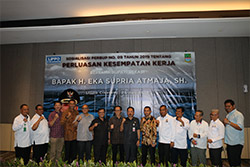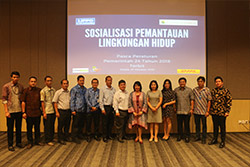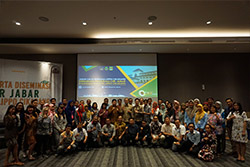With the increasingly complex business condition, the Company requires to continuously maintain the quality of Good Corporate Governance (GCG) implementation. Subsequent to its function as the forum that enable all bodies to perform within the Company’s set business direction, GCG implementation has created values and culture beneficial to the Companny as well as to all stakeholders
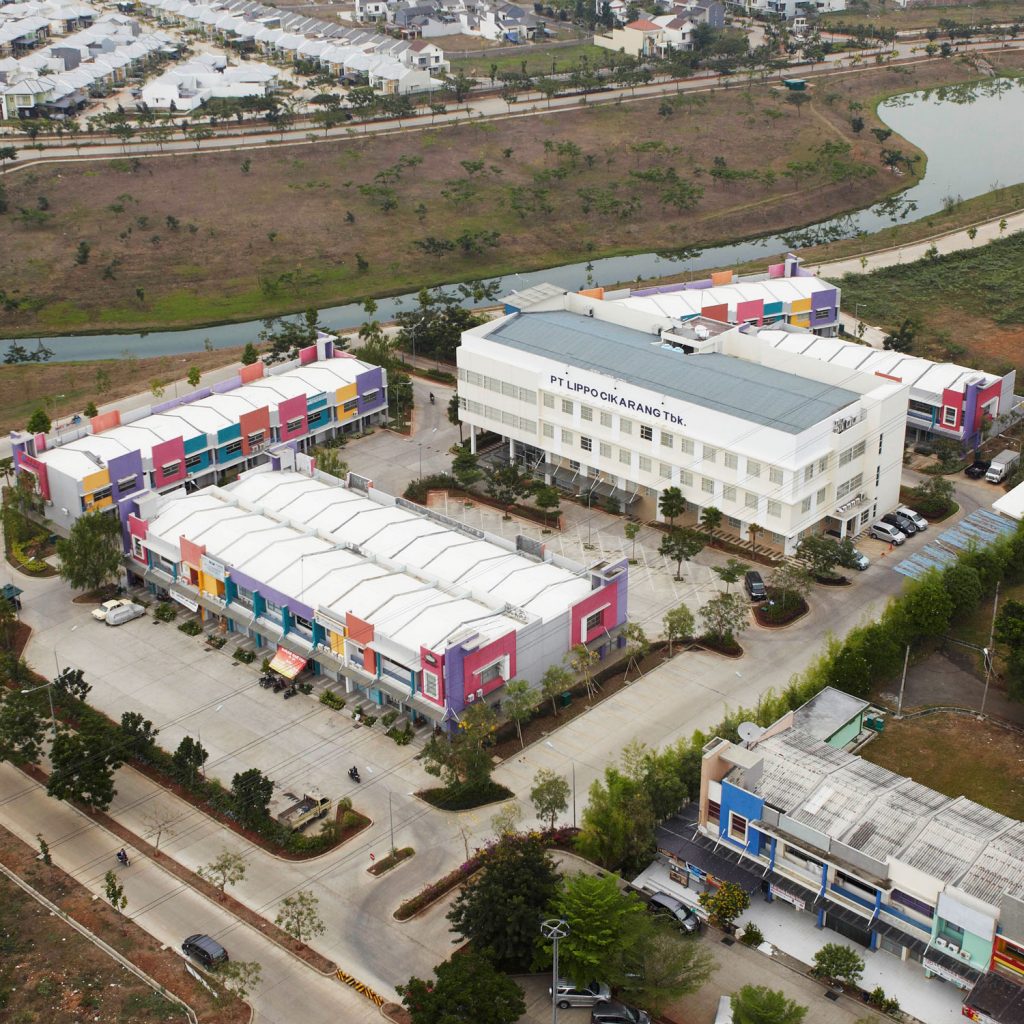
The increasingly complex business environment has demanded the Company to always keep up a strong implementation of Good Corporate Governance (GCG). Not only it allows the entire organs to perform in accordance with the Company’s business direction, GCG has also helped create a culture and values that not only proves to give benefit to the company, but also to all stakeholders. In an effort to align those interest with the Company’s objectives, the Company always adheres to the five principles Governance in its day-to-day business activities. The fives Principles are.
As a publicly listed company, the Company must be managed according to the principles of transparency. At the Company, this principle is implemented through the availability of accurate and adequate information related to the Company activities and achievements both in financial and non- financial terms. Accurate information available to stakeholders allows them to make calculated decisions depending on their interests in the Company. Information is released periodically and in a timely manner. Media used include the Annual Report and Biyearly Financial Statements in published in mass media. In addition, any current information considered relevant and material enough on issues pertaining to the Company is disclosed through a variety of media such as quarterly reports, press releases, and uploaded in the Company’s website at http://www.lippo-cikarang.com
Accountability is one of the main prerequisites in order for the Company to achieve success and sustainable performance. Therefore, the Company’s is managed on a corporate governance structure where each existing organ has clear roles and functions in order to synergize with one another.
Every company is responsible for all activities it carries out and must comply with all applicable laws and regulations including its own Articles of Association, Limited Liability Company Act, the Capital Market Authority and all regulations passed by the Indonesia Stock Exchange where the Company’s shares are listed and traded. As a good corporate citizen, the Company also observes its responsibility towards the society and the environment while providing benefits. The Company realizes that the surrounding communities also have a role in maintaining the Company’s business sustainability in the log run. This responsibility is embodied in Corporate Social Responsibility (CSR) programs through community development and environmental conservation activities.
GCG implementation will go well if a company is managed independently to ensure no particular organ dominates or intervenes other functions of the Company. Based on this principle, the Company should be managed independently by professionals. The Company has a Code of Ethics in place that is more specifically set up on the implementation of independence in order to prevent conflict of interest so that any business decision can be made objectively.
Every company must also base its operations on the principle of Equality and Fairness. In this regard, the Company has made a broad access to information available to all stakeholders through various communication media. Internally, the Company provides equal opportunity for new employees and opens up career opportunities for each one of them regardless of race, culture, religion, gender, or physical condition.
PT Lippo Cikarang Tbk
Hak Pemegang Saham dan Hak Karyawan
Hak Pemegang Saham
Hak Karyawan
Untuk menciptakan ketenangan serta kenyamanan dalam bekerja dan berusaha Perseroan telah menyusun Peraturan Perusahaan (“PP”). Hak, kewajiban, dan tanggung jawab Perusahaan dan Karyawan disusun dengan jelas di dalam PP dimana kedua pihak saling menghargai, saling menghormati, saling mempercayai, dan saling bekerja sama. PP juga memberi kebijakan mengenai kesehatan, keamanan, kesejahteraan Karyawan dan juga pelatihan dan pengembangan bagi Karyawan.
PP tersebut secara periodik ditelaah oleh Perusahaan.
Karyawan memiliki hak sebagai berikut:
PT Lippo Cikarang Tbk
Blackout Period
Preventions from Trading Company Shares
For the Board of Directors, LPCK Top Executives, and Related Employees
“The Board of Directors, LPCK top executives, and related employees (including their spouses and minors) are prohibited from trading Company shares two weeks before the release of the Company’s quarterly and annual financial statements, and they are also prohibited to trade Company shares for 24 hours after the release of financial statements.
Moreover, for those Board of Directors, LPCK top executives, and related employees (including their spouses and under aged children) who have knowledge of any confidential information that could have any impact to the Company’s share price are prohibited from trading Company shares until 24 hours after the shares are disclosed to the public.”
Whistleblowing System
A. The Scope, Purpose and Objectives
The Scope :
1. To outline all aspects necessary to build and implement whistleblowing system as a tool to govern the reporting of violations.
2. This Whistleblowing system applies to the interest of internal company that includes all employees, Board of Directors, and the Board of Commissioners.
Purpose
1. This Whistleblowing System is one of the inherent supervision built by the Company in performing internal controls that are consistent and continuous.
2. To provide a formal channel for employees in helping to create corporate governance in a professional manner to achieve good corporate governance.
3. The existence of standards in the expression of aspiration helps the Company to eradicate any violation or potential violation.
Objective
1. To help the Company to improve labor productivity through eradication of all forms of violations and potential violations.
2. To reduce the Company’s losses through early prevention as a follow-up action from reporting through various Whistleblowing channels.
3. To improve the image and reputation of the Company that has good corporate governance (GCG).
4. To improve the Company’s ability to win the competition through increasingly efficient operational management of the company.
5. To create a more conducive climate and encourages all employees in reporting to the things that can cause financial losses and non-financial, including those that may undermine the values and image of the company.
6. To simplify management to deal effectively with all forms of report violations and potential violations.
7. To protect the confidentiality of the reporter’s identity and security information reportedly managed in a special data base.
B. Rapporteur Protection Policy
The whistleblowing policy is part of the implementation of the company in practicing consistent code of conduct on an ongoing basis, therefore, the Company has committed that any reports of violation or potential violation is set as follows:
1. Rapporteur Protection Policy
This Whistleblowing Policy provides protection to the rapporteur in form:
a. The company provides reporting channels such as: a written letter to Whistleblowing Team, Whistleblowing Box, Whistleblowing site at www.lippo-cikarang.com sub menu Whistleblowing; Email Address whistleblower@lippo-cikarang.com; and Whistleblowing Team starts from the Committee, Management, and Facilitator. All these whistleblowing channels will ensure each reporting by well-meaning reporter.
b. A guarantee of the confidentiality of the identity of rapporteur who provide identity and information which can be used to contact the rapporteur if needed for clarification.
c. The Company ensures information security and protection against actions of the reported or companies, in the form of threats of physical safety, psychological terror, the safety of property, legal protection, job security, pressure, delaying a promotion or a salary, demotion or promotion, unfair dismissal, harassment or discrimination in any for m, and harmful notes that in the employee files.
2. Rapporteur Appreciation
The Company can give appreciation to every rapporteur who was contributing in an effort to help the prevention or capable of proving violation that can harm the company and to minimize the risk of the company significantly.
3. Sanctions to Rapporteur Who Abuse The System of Reporting on the Whistleblowing Channel
The Company aims to establish whistleblowing system that can run professionally and that the company will give sanction to the complainant who send the report in the form of slander or false reports. Sanctions given follows the regulation that applies in the Company, and the Company will not guarantee the confidentiality and protection to rapporteur abusing the system whistleblowing system including criminal prosecution as well as related civil unpleasant acts or defamation.
4. Sanctions to Whistleblowing Team who leaked reporting
The company strongly protect the confidentiality of the report which was reported by the complainant, therefore, each report leaked by Whistleblowing Team will be given sanctions in accordance with applicable regulations.
C. Structure of Whistleblowing System
The company established a whistleblowing system with the structure:
1. Board of Commissioner
The Board of Commissioners is responsible as overseers of performance and effective implementations of Whistleblowing system in the company and its subsidiaries. Monitoring whistleblowing system implementation may be submitted to the Committee of the Board Commissioner.
2. Whistleblowing Team:
a. Whistleblowing Committee
Whistleblowing Committee is chaired by the President Director and Talent Admin (HRG) Corporate Director is responsible for ensuring this Whistleblowing system can be implemented throughout the company and its subsidiaries. Whistleblowing Committee Chairman may appoint the members of the committee including the determination of the functions and duties of each member as well as future membership. The Committee Chairman shall ensure that all reporting followed until finished.
b. Responsible Whistleblowing
The Whistleblowing Committee will appoint each year the Board of Directors or Senior Executive alternately who is responsible for accomplishing and socializing Whistleblowing system to the business units under its coordination.
c. Facilitator
Each person in charge of a designated business unit is responsible for establishing each Facilitator in the division unit under its coordination. The Facilitator is responsible for socializing Whistleblowing culture to the units under its coordination.
d. Investigation Unit
Each entry must be coordinated by the facilitators to be submitted to the relevant responsible person who hereinafter is the responsible to bring any of those reporting on meetings organized by the Whistleblowing Committee to determine the eligibility of the report to be followed up by the investigation unit. This investigation unit consists of Internal Control Unit (SPI) or the internal auditor, and assisted by HR Audit specifically for cases related to Human Resources. This investigation unit is responsible for investigating cases that have been assigned by the Committee to look for the facts, data, and processes that must be performed by internal auditor.
D. Violation Reports
Each employees as regulated in the Code of Conduct must conduct and have moral obligation to report violations or potential violations and are forbidden to remain silent when they see violations or potential violation. The aspects that need to be considered:
1. Violation Principles
a. Each report should be placed as the practice of Good Corporate Governance and Risk Management.
b. The Company must receive reporting of violations and potential violations from the Rapporteur.
c. The principle of the report should contain goodwill and not a personal grief on the policies or management practices or based on bad intentions defamatory and / or false statements that may impose a co-worker or defame / person’s reputation.
2. Rapporteur
Rapporteur is grouped into 2 (two), such as:
a. Internal: Board of Commissioners, Directors, Senior Executive, and all employees.
b. External: the working partner, supplier, customer, consultants, vendors, outsourcing, communities and other stakeholders.
3. Form of Reports
a. Violations reports or potential violations must be submitted in writing and shall include the identity of employees (for external parties with copy of ID and phone number) and pour chronological occurrence and if possible provide supporting evidence.
b. Reports with no identity (anonymous) or anonymous letters will not be followed up by the Company.
4. Potential Violations or Violations That Can Be Reported
a. Corruption
b. Fraud
c. Money laundering d. Insider dealing
e. Unlawful acts (including theft, use of force against an employee or leader, extortion, drug use, abuse, other criminal acts)
f. Violations of tax regulations, or other legislation
g. Violations of the Code of Conduct or the Company Values or violation of the norms of decency in general
h. Acts that endanger the health and safety, or jeopardize the security of the company
i. Actions that could lead to financial and / or non-financial losses against the Company or damages the interests of the Company
j. Violation all company policies, including but not limited to company regulations, codes of conduct, corporate policies, Standards Operating Procedure (SOP) and implementation instructions
k. Others who support the creation of Good Corporate Governance.
5. Time To Report A Violation or Potential Violation
Rapporteur should have a concern in the reporting time, the faster the report will further facilitate the follow-up investigation, the longer reporting submitted will enable the loss of evidence when an investigation. Rapporteur is expected to transmit its reporting within a period of 2 (two) months after the incident occurred, and specifically for fraud cases a maximum of 1 (one) month after the incident occurred.
E. Delivery Mechanism of Violation Reports or Potential Violation
1. Report Submission Infrastructure
The company provides a wide range of Whistleblowing infrastructure channels that can facilitate the reporting immediately submit a report, namely:
a. Written letter to Whistleblowing Team, by direct transfer or by mail. b. Email address:whistleblower@lippo-cikarang.com.
c. Company website: www.lippo-cikarang.com at the Whistleblowing menu.
d. Whistleblowing box.
2. Authority to Handle Violation Reporting
a. In the case of violations committed by members of the Board of Directors or the person who has a special relationship with the members of the Board of Directors or by the Whistleblowing Team, the reporting of a violation or potential violation must be submitted to the Board of Commissioners and if necessary can use independent investigator or an independent auditor.
b. If the offense was committed by members of the Board of Commissioners or Whistleblowing Team, the report must be submitted to the CEO Corporate, which further handling of the follow-up is carried out by the Board of Directors and when required may use independent investigator or independent auditor.
c. In the case of violations committed by the employee, then the report must be submitted to the Whistleblowing Team and then the Whistleblowing Team will decide whether or not to follow up or investigation conducted by the Internal Control Unit (SPI) or the internal auditor or by special audit HR for cases related to Human Resources.
F. Investigation
For all reports that have been decided by the Whistleblowing Committee for further action through investigation, the investigation process will be conducted with the aim of gathering evidence to strengthen
conclusions from each case that has been investigated. Results of these investigations allows violations or potential violations that exist and / or allow the case to be investigated further to others cases, or the results of these investigations turned out to be not proven or not enough evidence to support the do follow up.
Considering the objectivity and independence, the investigation will be conducted by Internal Control Unit (SPI) or the internal auditor or by a special Audit HR for cases related to Human Resources. In sensitive cases or certain cases for example that must be investigated is Internal Audit (SPI) or the internal auditor or audit HR specifically, the Whistleblowing Committee can decide the investigation performed by other work units or investigator or independent auditor from external parties.
The process of investigation must be free from bias and do not depend on who is reporting or who is the reported and have presumption of innocence first. The reported must be given full opportunity to provide an explanation for proofs given against him, including the defense if needed.
Results of the investigation will be returned to Whistleblowing Committee for further action. If the result of the investigation shows positive violations or potential violations therefore the violator will be given applicable sanctions even for civil or criminal cases can be forwarded through reporting to the authorities which will be coordinated with the Company’s Legal Division.
The Company is fully committed in conducting its business by complying with the applicable laws and regulations, including but not limited to regulations related to GCG practices, which among others stipulate the behavior guidelines, namely anti-bribery, anti-fraud and corruption, anti-gratuity, anti-nepotism, anti-money laundering, anti-terrorist and prevention of funding of activities related to terrorism, anti-hoax, and anti-monopoly/oligopoly/trust/cartel.
Upon the aforementioned issues, the Company reaffirm its commitment to implement the good and clean governance practices. The Company has also implemented provisions relating to standards of conduct (Code of Conduct) which must be implemented by all employees, including Directors and Commissioners without exception. The Company’s Code of Conduct is a close part of the implementation of good corporate governance that is continuously socialized and every year employees are required to recertify their understanding of the Company’s Code of Conduct.
The management of the Company’s business is closely related to third parties, both individuals, corporations and government agencies and institutions including State-Owned Enterprises, both regional and central government. Therefore, the Company is committed to managing each of its business units by adhering to GCG principles that are subject to and applying applicable regulations. The Company strives optimally to prevent all forms of violations and/or deviations from the regulations both the Company’s internal regulations and applicable government regulations, including anti-bribery, anti-fraud and corruption, anti-gratuity, anti-nepotism, anti-money laundering, anti-terrorist and preventing funding against activities related to terrorism, anti-hoaxes, as well as monopoly/oligopoly/trust/cartel instruments.
This Policy aims to provide the Company with a direction and guidance so that in carrying out its business, the Company will not allow and always take measurable mitigation measures to prevent all actions, including the potential for violations of the provisions. By implementing this policy consistently and continuously, the Company is increasingly able to improve the quality of the implementation of GCG practices as a whole in order to achieve progress and sustainability of the Company in the long term.
Sanction against Gratuity, Money Laundering, Bribery, and Corruption Violations
Gratuity, Money Laundering, Bribery, and Corruption are serious crimes that cannot be tolerated.
Every Employee is required to prevent and not conduct acts of gratuity, money laundering, bribery, or corruption, and shall always be aware of any indications or risks of such criminal acts in all aspects of the Company’s business activities and operations.
The sanctions imposed given to employees are based on the level of violations conducted, the sanctions include mentoring, warning, written warning, or termination of employment. In 2018, the Company did not receive any complaint regarding gratuity violation
RELATIONSHIP WITH SUPPLIERS, VENDORS (PARTNERS INCLUDING OUTSOURCING) AND CONSULTANTS
RELATIONSHIP WITH SUPPLIERS, VENDORS (PARTNERS INCLUDING OUTSOURCING) AND CONSULTANTS
PT Lippo Cikarang Tbk
Disclosure Policy
Disclosure of information has been an important element of Good Corporate Governance. The Board of Directors of PT Lippo Cikarang Tbk (“LPCK”) has regulated the Disclosure Policy that applies to shareholders, investors, public, and other stakeholders. The disclosure is to ensure that the disclosed information is legitimate, accurate, correct, and clear.
Information of LPCK in various method such as in writing, verbal, by telephone, internet, press releases to journalists or investors (press conference), teleconference, or any other kinds of method used by government agencies or other persons to give information to the general public are all covered in this Disclosure Policy.
The standard of Disclosure
The regulation of BAPEPAM Rule Number X.K.1 : Disclosure of Information That Must Be Made Public Immediately, Attachment : Decision of the Chairman of Bapepam Number : KEP-86/PM/1996 Date : January 24, 1996 states that every Public Company that has been registered and become effective, must inform Otoritas Jasa Keuangan (“OJK”) and disclose to the public as soon as possible, no later than 2 (two) days after the decision or changes in Information or Material Facts that will affect the share value of the Company or Investor’s decision.
The Material Information
Events, information or material facts, that may reasonably effect the price of securities or investors’ decisions may, among other things, consist of:
Authorized Person to Disclose Material Information
LPCK has regulated that the following persons are authorized to respond to inquiries or provide Material Information:
The Timing of Disclosure of Material Information
LPCK is very strict and careful in keeping material information or other related information so that it will not be released before the designated date, especially during the two-week period prior to the disclosure date.
No employee is allowed to disclose any information at any time unless designated by the CEO, and the President Director of LPCK.
| Detail | Download |
|---|---|
| Employees Code of Conduct | Download |
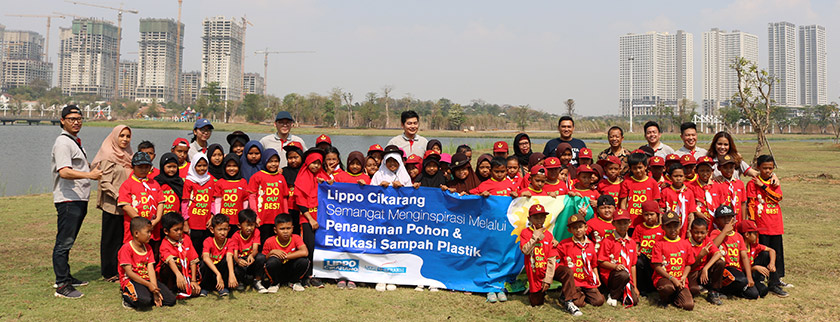
The Company participates in a multitude of ways to improve the welfare of our surrounding communities. We realize that the communities living nearby are also stakeholders, who have their share of contribution to the Company’s business sustainability.
Lippo Cikarang’s CSR activities generally aim to make the best use of Company’s competence in providing optimal benefits to all stakeholders as a manifestation of its social responsibility.
The Company has a mission to promote and apply environmentally friendly and natural concepts within all of its project developments and city management activities. Anyone who walks across our township will clearly see the application of this concept through industrial, commercial and residential zones, which reflect well-conceived planning.
As of 31 December 2018, the Company allocated Rp4,584,533,938 for the entire CSR programs that are implemented in the fields of the environment, employment, occupational health and safety (OHS), community and social development, and customer responsibility.
In 2018, The costs incurred by the Company for CSR programs in the environmental sector amounted to Rp15,000,000.-.



In 2018, the costs incurred by the Company for CSR programs in the fields of Employment, Occupational Health and Safety amounted to Rp949,485,579.-.
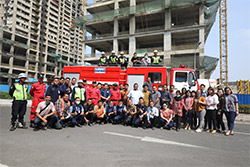

From this program the Company also provided assistance in the form of learning equipment. Lippo Cikarang in 2019 was conducted in 5 (five) different schools, including; SDN 03 Cibatu, SDN 02 Cicau, SDS Ekklesia, SDS Don Bosco III, and SDN 01 Cicau with a total of 1,224 students from all schools.
In this program the Company collaborates with health experts from Siloam Hospitals Lippo Cikarang in providing counseling materials and also providing lemongrass seedlings that can be planted to help prevent the development of mosquito larvae that cause dengue fever.
Pada program ini Perseroan bekerjasama dengan tenaga ahli kesehatan dari Siloam Hospitals Lippo Cikarang dalam memberikan materi penyuluhan dan juga memberikan bibit tanaman sereh yang dapat ditanam untuk membantu mencegah perkembangan jentik nyamuk penyebab demam berdarah.
In 2018, The costs incurred by the Company for CSR programs in the field of Social and Community Development amounted to Rp3,493,548,359
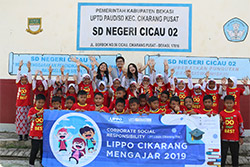
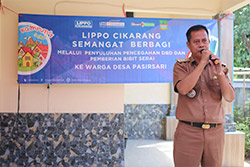
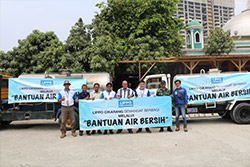
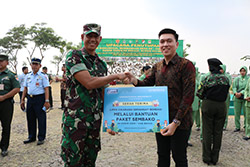



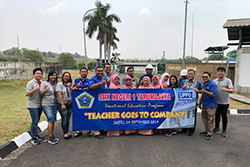
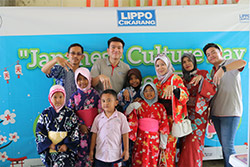
The Company has a high commitment to consumers which can be seen in the Company’s values, namely focus on customers. Consumer responsibility covers aspects such as Pre-sales, product quality, and after-sales services. In each of these aspects, the Company provides support facilities including the provision of channels that can be used by customers to communicate with the Company and provide advice and input. The facility is to provide comfort for consumers, maintain the quality of the products offered and facilitate good relationships with customers. In this case the Company optimizes the use of information technology.
The Company periodically conducts a number of activities to maintain and maintain communication between residents and Lippo Cikarang in order to create harmonious communication and relations between communities within the Lippo Cikarang environment.
Throughout 2019, the Company has carried out 8 (eight) times the activities of socialization and communication with customers, including;
Regarding the handling of consumer complaints, the Company provides several complaint services, namely as follows:
In 2019, the Company received 3,280 complaints. A total of 2,863 complaints submitted to the Company have been addressed properly through the mechanism of meetings with residents and tenant gatherings, and as many as 382 complaints are still being addressed.
The costs incurred by the Company for CSR programs in Responsibility to Consumers amounted to Rp126,500,000

